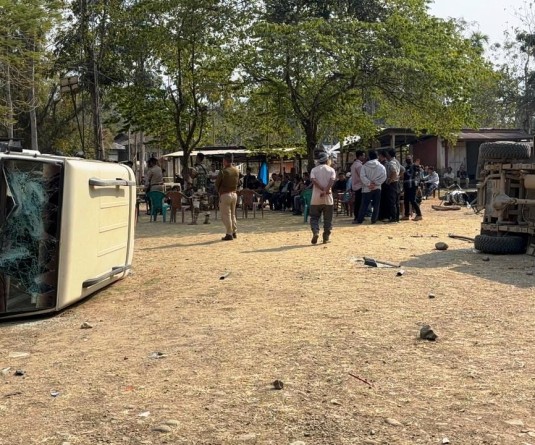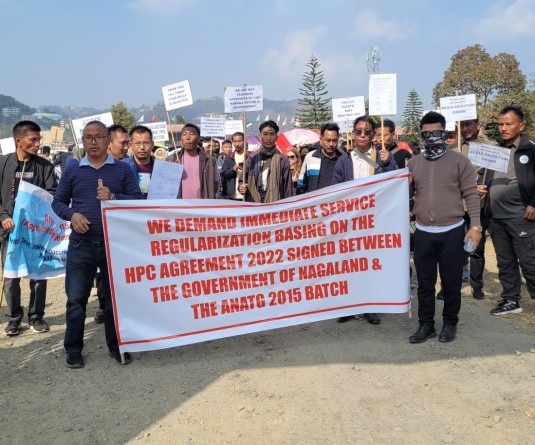
Says any deliberation on both issues must be made with utmost caution
Dimapur, February 1 (MExN): The NSCN/GPRN (Khango) today stated that the timing and implications of the statement regarding the abrogation of Article 371A, intertwined with removal of FMR (Free Movement Regime), are “concerning.”
These developments suggest the intention of the Government of India and some of the State’s legislators to compromise “our rightful interests and succumb to pressure, potentially diluting the protective provisions related to customary laws, ownership, and transfer of lands and its resources,” it maintained.
To this end, it asserted that any deliberations pertaining to Article 371A and must be made with utmost caution ensuring the long-standing aspirations and rights of the Nagas, and their unique identity and governance structure are honoured and protected.
Navigating the intricate issue demands an acute understanding of Article 371A of the Indian Constitution, the ongoing Naga political dialogue, and the implications of the FMR across Indo-Myanmar Border, it said.
“Each element bears particular significance in framing the sovereignty and the rights of the Naga people,” it asserted.
According to the NSCN/GPRN (Khango), the Article 371A stands as a bastion of the rights and customs of the Nagas, safeguarding the “sanctity of our laws, and ensuring the preservation of land and resources within our territory.”
Hence, it flayed the “recent utterances by certain political figures” that the provisions act as barrier to development and said such statements strike a dissonant chord with the fundamental principles that underpin the special protection of the Naga’s heritage.
The NSCN/GPRN (Khango), further maintained that such declarations, seemingly resonating with the GoI’s objectives, not only erode the “very foundation of our statehood and Identity but also overshadow the valiant struggles endured by our ancestors to preserve our inalienable rights to our land.”
Further asserting that Nagas historically were never dominion of the Indian union, it stated that the sanctity of Article 371A is not “merely a constitutional safeguard but is emblematic of their toil” and ensure that Nagas’ cultural, social, and economic interests remain shielded from external incursions.
The NSCN/GPRN (Khango) also termed reported proposal to fence the Naga-Myanmar border as an “insidious attempt to further divide Naga communities, infringing upon our right to maintain social and cultural coherence across an imposed border.”
It would not only segregate the Naga communities but potentially undermine the protections afforded by Article 371A, as it pertains to the land and its ownership. It contended.
Further, it pointed out that the Indo-Myanmar border along the Naga Territory was demarcated “solely with reliance on satellite imagery” without consulting Naga stakeholders.
Such action signifies a procedural oversight and in violation of the Provisions governing Article 371A, it added.
Therefore, given the importance of the Indo-Myanmar border to Naga people, whose traditional territories extend “well beyond the 40-kilometer range,” the NSCN/GPRN (Khango) batted for a more inclusive and respectful dialogue surrounding territorial assessments and demarcation processes.
It also asserted that the authority to determine the course of the lands resides “solely with the Naga people” and noted that the imposition of a physical barrier without the consent of the Naga populace will not only undermine their “rights to self-determination and the management of own affairs” but also contravenes the spirit of the protections enshrined in Article 371A.
“It carries the potential to sever the deep-rooted connections among our people, disrupting the socio-cultural cohesion that is central to our identity,” it added.
Accordingly, it asserted that it is imperative that the GoI recognises and honour this principle and refrained from “interventions that risk further fracturing the Naga community.”
“It is crucial that any decisions regarding the demarcation of our territory involve thorough and respectful dialogue with the Naga community,” it added, advocating an inclusive process which gives precedence to collective will of people in matters that directly impact land and its people.
Only through a partnership that respects the Nagas’ unique history and identity, and the special constitutional status, we can move towards a future that harmonises the legitimate security concerns of the GoI, along with the preservation of the Naga people's rights and unity, it opined.
In light of these developments, the NSCN/GPRN (Khango) said that it is paramount for the Naga people to stand together with unity and unwavering determination in safeguarding their rights and preserving their rich heritage.
Any deliberations on Article 371A and FMR must be made with utmost caution ensuring the long-standing aspirations and rights of the Nagas, as well as their unique identity and governance structure are honoured and protected,” it added.
The dialogue must be approached with the utmost respect for these values, ensuring that any path forward harmoniously blends the aspirations of all parties involved, with the non-negotiable preservation of our rights at the forefront.





